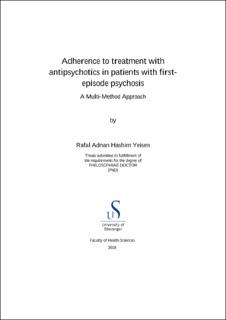Adherence to treatment with antipsychotics in patients with first-episode psychosis: A Multi-Method Approach
Doctoral thesis
Permanent lenke
https://hdl.handle.net/11250/2652099Utgivelsesdato
2019-02Metadata
Vis full innførselSamlinger
- PhD theses (HV) [52]
Originalversjon
Adherence to treatment with antipsychotics in patients with first-episode psychosis: A Multi-Method Approach by Rafal Yeisen, Stavanger: University of Stavanger, 2019 (PhD thesis UiS, no. 431)Sammendrag
Adherence to treatment recommendations is a crucial aspect of health care in general, and especially in mental health care. However, it has been given less concern in everyday clinical practice than needed. In inpatients the medicines are usually given by healthcare professionals, who observe that they are taken, creating a sense of certainty that adherence will continue in the post-acute setting when patients have been discharged. Rates of adherence in patients with mental illness differ in different studies, but overall findings have indicated that less than 50% of patients fully adhere to treatment. Non-adherence or poor adherence to medication might have a negative impact on the course of illness resulting in relapse, re-hospitalization, poor outcome and increased consumption of health services and costs.
The overall aim of this thesis was to explore the complexity of the adherence to medication treatment by patients with psychosis. This was done, first by assessing the degree that (i) physicians followed treatment algorithms, (ii) patients followed the physicians’ recommendations, and (iii) adherence influenced outcome. The next step was an in depth investigation of the reasons for deviation from standards by interviewing physicians and patients mainly on current knowledge and attitudes regarding antipsychotic medication.
Methods
Adopting a mixed-methods approach helped us to perceive the adherence issue from more than one perspective and gaining deeper insights into reasons for patients’ non-adherence. In the first study, we adopted a quantitative approach to assess patients’ adherence to psychiatrists’ recommendations and psychiatrists’ adherence to treatment guidelines. A qualitative approach was adopted in the second and third studies, to investigate in depth the reasons for deviation from standards by interviewing patients and psychiatrists.
Results
The first study revealed that 62% of the physicians adhered to the local medical algorithm. However, while the initial medical intervention followed the international standards, the physicians failed to adhere to algorithms in the one-year follow-up of medication regimes. Fifty‐six percent of patients used their medicines more than 75% of the time. Patient adherence to medication was significantly associated with good outcomes. Study 2 showed that patients do not choose to jeopardize their medication regime independently. Healthcare staff plays an important role in maintaining good adherence by being empathetic and supportive in the admission phase, giving tailored information according to the patients’ condition and involving patients when making treatment decisions. Study 3 highlighted how the role of the government in complicating the adherence issues by demanding the regional health authorities to establish a medication-free treatment option for patients with severe mental illnesses. However, despite all the internal and external pressure faced by psychiatrists, this did not affect their professional integrity in medical decisions based on guidelines, expertise and research studies.
Conclusion
A range of factors influence medication adherence, and an individualised approach is important in order to intervene successfully.
Består av
Paper 1: Yeisen RAH, Joa I, Johannessen JO, Opjordsmoen S. Use of medication algorithms in first episode psychosis: a naturalistic observational study. Early Interv Psychiatry, 2016; 10: 503-510.Paper 2: Yeisen RAH, Bjornestad J, Joa I, Johannessen JO, Opjordsmoen S. Experiences of antipsychotic use in patients with early psychosis: a two-year follow-up study. BMC Psychiatry, 2017; 17: 299.
Paper 3: Yeisen RAH, Bjornestad J, Joa I, Johannessen JO, Opjordsmoen S. Psychiatrists’ reflections on a medication-free program for patients with psychosis. Submitted to Journal of Psychopharmacology
